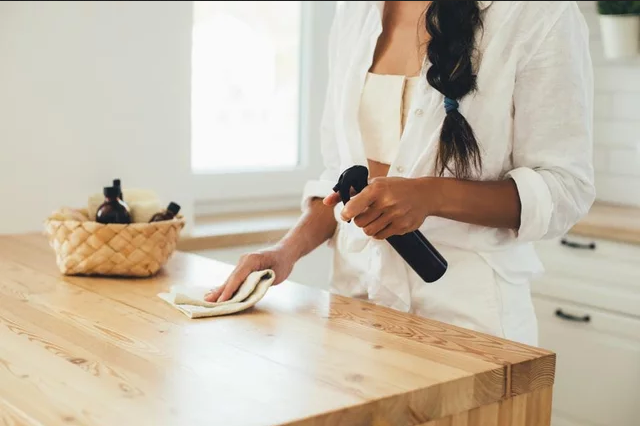
Regular household cleaners are typically filled with harsh chemicals (eg: formaldehyde, phthalates, butoxyethanol and ammonia) that can be harmful to your home and family….CONTINUE READING
Using alternative natural solutions like essential oils is a safer (also more eco-friendly) way to clean your home.
“Essential oils are plant extracts made by pressing and steaming different parts of plants, such as bark, flowers and leaves,” says Yasmin Sharp, aromatherapy expert at Nikura.
While essential oils are commonly known for their vibrant scents, they can also double as effective household cleaners thanks to their antibacterial, antifungal and pest-repellent properties, she explains.
Ongoing studies
have shown that essential oils could hold disinfectant properties, effective against viruses and bacteria. By combining a few drops of essential oils with a spray bottle of another liquid, they are a natural, safe, and non-toxic way to clean your home. Not only are they affordable, but they also work well for personal care and aromatherapy.
To help you get started, Sharp shares the five most effective essential oils to use for cleaning:
#1 Peppermint oil:
Peppermint is a hygienic oil that carries antimicrobial and antifungal properties. Research has shown that it is a spider-repellent due to monoterpenoids in the oil that claims to act as fumigants. The natural sanitizer has an invigorating smell that can remove bacteria harboring in your room and on surfaces. Showers are a breeding ground for bacteria. To create a daily shower spray, combine ¼ cup of rubbing alcohol, ¾ cup of water and 10 drops of peppermint oil into a spray bottle. Shake well, spritz after a shower and don’t rinse.
#2 Tea Tree Oil:
Tea tree, also called melaleuca oil, has been used for centuries, famous for its antiseptic abilities, and is well known for the capability to protect against infections. It is best for everyday cleaning throughout the house and works especially well in removing musty odors in kitchens, bathrooms and lofts. Your kitchen sink can be a magnet for mold, bacteria and fungus. Add 2-3 drops of tea tree oil to one cup of baking soda before scrubbing your sink. Focus especially on the drain and grooves to eliminate any growing mildew.
#3 Basil Oil:
Basil has many uses in home cleaning, due to being antibacterial it is fantastic at cleaning kitchen tools and equipment. A study
found that the use of basil oil can decrease germs and food-borne pathogens, which keeps the food we eat safe. It is also useful in removing bacteria from surfaces and freshening the air.
Put a drop of diluted basil oil into your basin when washing fresh produce to potentially reduce the risk of harmful microorganisms and bacteria.
#4 Lavender Oil:
Lavender is mostly associated with tranquillity and sleep, but it’s also beneficial for laundry. It could stop mold and mildew from building up in clothes and provides a floral scent. Acting as a disinfectant and deodorizer, lavender is a gentle all-purpose cleaner. Add 2-3 drops of lavender oil to your regular detergent or fabric conditioner before you pour it into your washing machine.
#5 Lemon Oil:
Lemon is well known for its strong cleaning properties, so it’s no surprise that lemon oil is a versatile cleaning agent. Lemon oil provides a clean, citrus scent without any heavy chemicals and is used to remove bacteria and fungi around the home due to its powerful disinfectant properties and the ability to attack harmful microorganisms. Due to its acidic roots, it works well in all-purpose cleaners for kitchens and toilets, leaving surfaces sparkling. Lemon oil could also be used to clean wood, windows, and carpets. For surface cleaning, add 5-6 drops of lemon oil to 1/8 cup of water in a spray bottle and apply to a cloth before rubbing the surface….CONTINUE READING